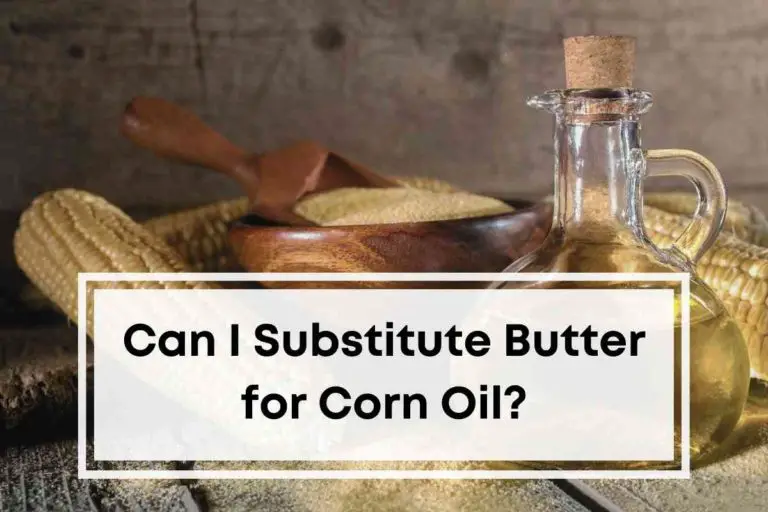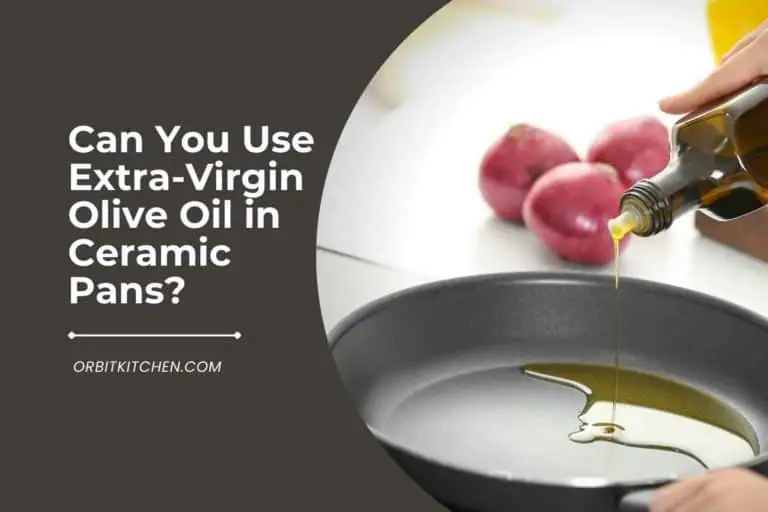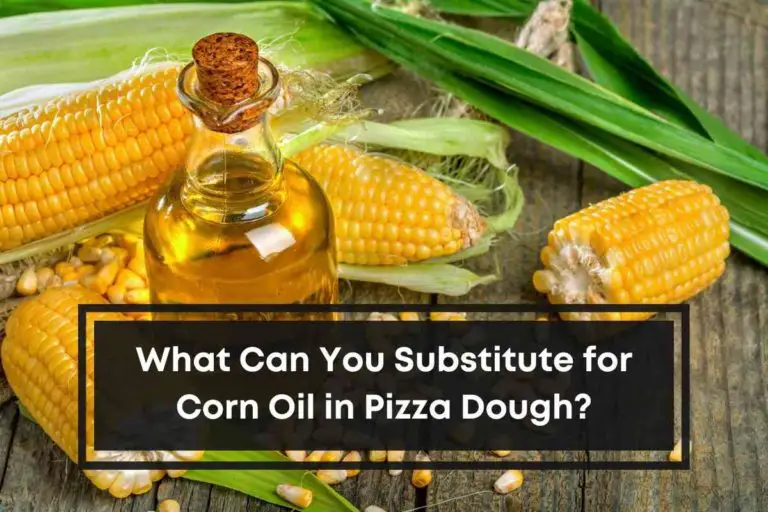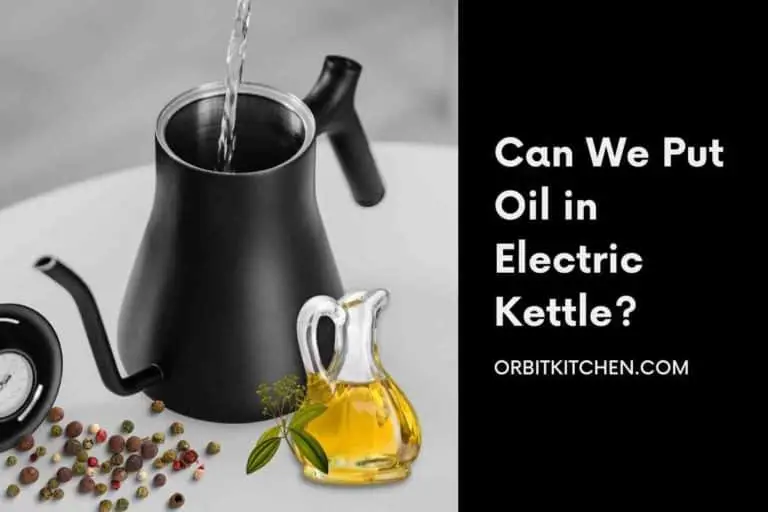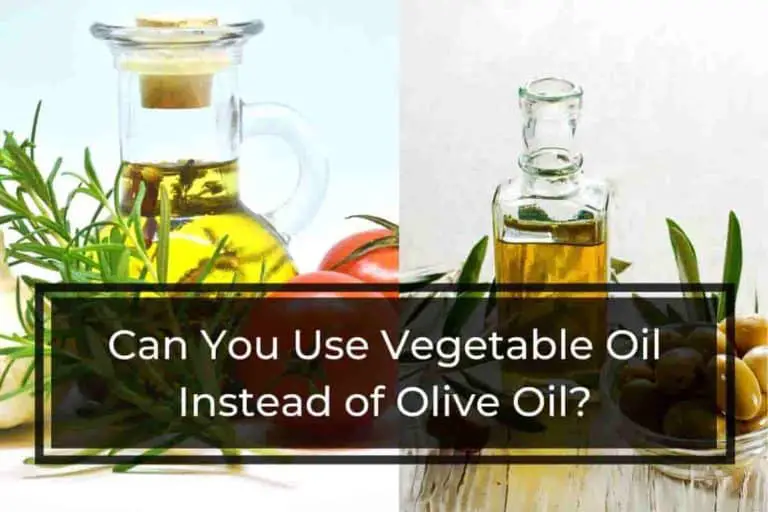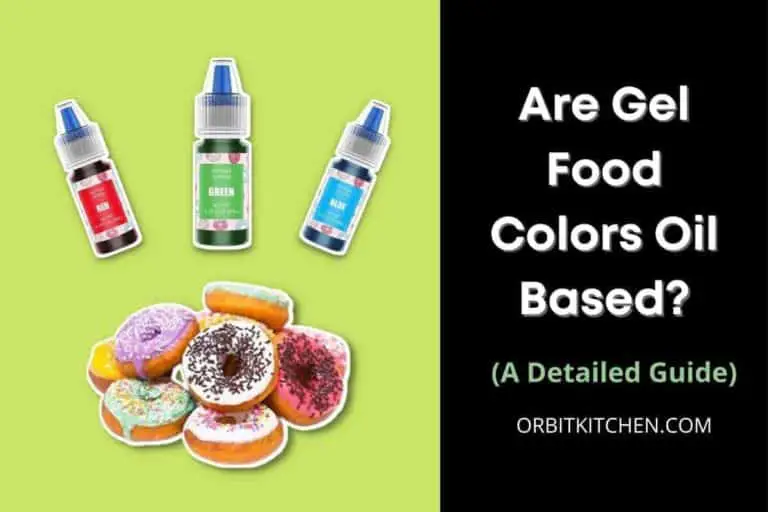17 Best Substitutes for Corn Oil
Corn oil is one of the most popular cooking oils today. It’s used in everything from salad dressings to frying foods. But it’s also a common ingredient in many baked goods, which is why it’s a popular choice for those looking to cut back on their oil intake. But, it’s not the only oil you can use to replace corn oil in your recipes.
In this post, we’ll help you find some of the best substitutes for corn oil, so keep reading.
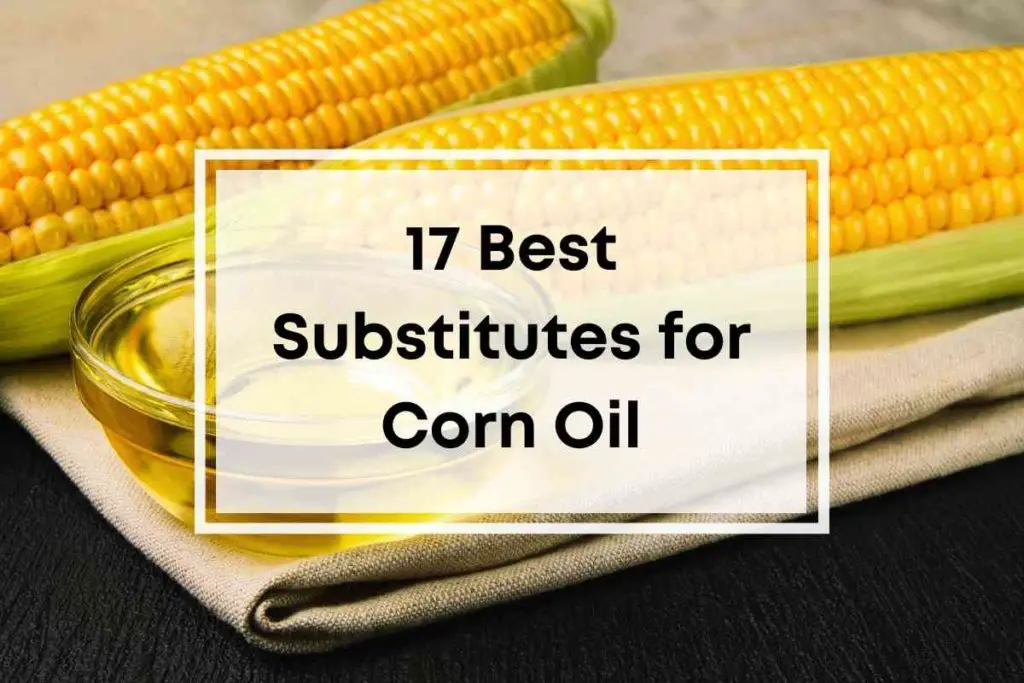
17 Best Substitutes for Corn Oil
Corn oil is a staple ingredient in many recipes. However, its popularity has led to a rise in prices over the years. If you’re looking for a cheaper alternative, there are plenty of options.
Here is the list of the 17 best alternatives to corn oil, including its uses in cooking and baking.
1. Canola Oil
Canola oil is an excellent substitute for corn oil. It’s made from pressed rapeseed, and though it comes from the same family of plants as mustard, it has no unwanted taste or odor. It’s high in monounsaturated fats (the good kind), low in saturated fats, and can be used in all sorts of cooking techniques.
Canola oil can be used when baking bread and pastries to give them a light texture and airy crunch; you’ll also find that it works well with salad dressings and sauces if you’re doing low-calorie versions of those things.
It’s a healthy option for stir fry because it can withstand higher temperatures than other oils without breaking down into toxic compounds like trans fat (formed when vegetable oils are heated at high temperatures).
The same goes for deep frying: Canola oil will not cause heart problems when consumed regularly over time as other vegetable oils will do! You should also feel free to use this as your go-to choice when making popcorn—it won’t give off that “old” flavor we associate with processed snacks like potato chips or pretzels!
2. Sunflower Oil
Sunflower oil is an excellent substitute for corn oil, as it is high in vitamin E and linoleic acid, which are antioxidants that help your body absorb fat-soluble vitamins. Sunflower oil also contains oleic acid, which has been shown to lower LDL cholesterol—the wrong kind of cholesterol.
It is a plant-based oil that is high in Omega-3 fatty acids. These fatty acids are essential for maintaining heart health, preventing cancer, and aiding in weight loss.
Sunflower oil can be used in place of corn oil when cooking at home or in restaurants. It can be used as a salad dressing (just be sure to check the label so you know how much sugar is added), as a substitute for regular olive oil when baking or frying foods, or just about anywhere else you’d typically use corn oil!
It can substitute corn oil in many cooking appliances, including skillets, baking pans, and waffle makers. It also works well as a replacement for vegetable oil in salad dressings and dips.
One of the main benefits of using sunflower oil is that it is GMO-free. This means that it does not contain any genetically modified ingredients.
3. Soybean Oil
Soybean oil is a good substitute for corn oil. It is a healthy oil that you can use in many recipes.
One of the best substitutes for corn oil is soybean oil. Soybean oil is a healthy oil that you can use in many recipes. It has a neutral flavor and can be used in place of both corn and olive oils. Soybean oil is also a good choice for cooking because it doesn’t have a strong taste.
Soybean oil is the most commonly used oil in the United States. It’s made from soybeans and contains omega-6 fatty acids, vitamin E, and phytosterols.
Soybean oil has a mild, nutty flavor, making it a great choice for cooking and baking. It’s also excellent for frying because it has a high smoke point (390°F) and doesn’t oxidize quickly at high temperatures.
4. Safflower Oil
Safflower oil is an excellent alternative to corn oil. It has a similar flavor and can be used in many cooking recipes. It is a plant-based oil derived from the saffron crocus’s seeds. It is sometimes called “vegetable oil” or “cooking oil.”
It has a similar flavor and can be used in many cooking recipes. You can use it in place of olive oil, canola oil, or vegetable oil in most recipes. It also has a low smoke point, so you should not use it in high-heat cooking applications.
Safflower oil is a good substitute for corn oil, as it contains little to no saturated fat and is high in linoleic acid. Safflower is also rich in vitamin E and antioxidants, which may help guard against heart disease, cancer, and aging.
Safflower oil has more oleic acid than corn oil (about 72 percent compared with 58 percent). Oleic acid is a monounsaturated omega-9 fatty acid considered heart-healthy because it helps lower LDL cholesterol levels while raising HDL cholesterol levels. It also lowers blood pressure by causing blood vessels to relax and expand.
5. Olive Oil
One of the best substitutes for corn oil is olive oil. Olive oil is a healthy option used in many different recipes. It has a mild flavor and can be used in place of other oils such as corn oil.
It’s also a good choice for cooking because it contains no saturated fats. This means that you can use it for cooking foods such as chicken breasts without adding extra calories or fat. Olive oil also contains monounsaturated fats, which are beneficial for your health.
It has a mild flavor and can be used in many different recipes. Plus, it’s a good choice for cooking since it doesn’t contain any saturated fats or monounsaturated fats that are beneficial for your health.
Olive oil is a healthy addition to many recipes and cooking, whether drizzled on bread or used in place of butter. It can be used as a substitute for corn oil in any recipe that calls for it. Olive oil contains vitamin E, monounsaturated fats, antioxidants, and oleic acid, which are beneficial for your health.
In addition to being nutritious, olive oil has anti-inflammatory properties that help with arthritis symptoms and skin disorders like eczema or psoriasis. The Mediterranean diet is linked to lower heart disease and stroke rates than other diets due to the regular inclusion of olive oil in meals.
6. Rice Bran Oil
Rice Bran Oil is an excellent replacement for corn oil. It has a high smoke point, which can be used in hot cooking temperatures without damaging dishes. Rice bran oil has a long shelf life, so you can store it indefinitely in a cool and dark place.
It’s high in antioxidants, which are great for your health and preventing diseases like cancer. The vitamin content is also high: rice bran contains vitamins A, B1, and B2, B6, D, and E. Rice bran contains thiamine (vitamin B1), and riboflavin (vitamin B2), pantothenic acid (vitamin B5), niacinamide (vitamin PP) and vitamin B12.
It’s important to note that not all types of rice bran oil have the same nutritional profile as others; some are designed with other purposes in mind. So be sure to check out reviews before buying an item based on its name!
7. Flaxseed Oil
Flaxseed oil is a rich source of omega-3 fatty acids, which have been shown to reduce heart disease risk and relieve symptoms of depression. The oil also contains alpha-linolenic acid (ALA), an omega-3 fatty acid that the body cannot produce on its own but must derive from the diet.
ALA has been shown to help lower cholesterol levels in people with diabetes and may help regulate blood sugar levels in people with prediabetes or diabetes.
Flaxseed oil is also rich in lignans—an antioxidant that may help ward off cancer and other diseases by reducing inflammation throughout the body.
8. Avocado Oil
One of the best substitutes for corn oil is avocado oil. Avocado oil is a healthy oil that you can use in place of corn oil in many recipes. It is a good source of healthy fats, and it has a low-calorie content.
You can use avocado oil instead of corn oil as cooking oil, salad dressing, and frying oil. You can also use it in place of other types of oils in baking recipes. It has a mild flavor, so it can be used in foods that are not typically flavored with oils.
Avocados are a healthy fruit that can be eaten on their own or used in recipes. They are high in vitamins and minerals, including vitamin E and potassium. Avocados are also cholesterol-free.
Avocado oil is high in monounsaturated fat, which means it’s a good choice for cooking. It’s also relatively stable at high temperatures and can be used for frying and baking. This makes avocado oil great for sautéing, salad dressings, marinades, dips, sauces—pretty much anything you would use corn oil for.
9. Almond Oil
Almond oil is a pale yellow colored oil that is extracted from the almond fruit. It is a very high source of monounsaturated fats, which are known to help reduce LDL (“bad”) cholesterol levels and increase HDL (“good”) cholesterol levels. It also contains vitamin E, vitamin D, and antioxidants that promote good health when consumed regularly.
It’s important to note that almond oil shouldn’t be heated or used for cooking because it can become rancid at specific temperatures. Instead, use it as a salad dressing or drizzled on fish or chicken after it has finished cooking, so you get all of its benefits without ruining the taste of your food!
10. Coconut Oil
There are many substitutes for corn oil, and coconut oil is one of the most popular. Coconut oil is a healthy alternative to corn oil because it has fewer adverse effects on the body.
One of the main reasons why coconut oil is so popular as a substitute for corn oil is its high smoke point. This means you can use it for cooking at high temperatures without burning. Coconut oil has many uses beyond cooking, such as skincare and hair care.
While coconut oil is an excellent substitute for corn oil, it is not perfect. Coconut oil contains saturated fats, which can be bad for the body. However, coconut oil is a healthy and versatile option that you can use instead of corn oil.
It’s rich in medium-chain triglycerides (MCTs), which are easier to digest than other fats. And it has a high smoke point—the temperature at which a fat begins to break down and release free radicals into the air—so you don’t have to worry about burning your food.
However, coconut oil also contains lauric acid, which can raise cholesterol levels when consumed in large quantities over time. And because it’s made up mostly of saturated fat, coconut oil tends to be solid at room temperature; this makes it harder to use as an ingredient.
11. Mustard Oil
Mustard oil is an excellent alternative to corn oil because of its distinctive flavor, high smoke point, and nutritional value. It has a mild taste and can be used in dressings, sauces, and gravies. It also has a high smoke point, so you can use it in ovens and cookware exposed to high temperatures.
Mustard oil is commonly used in Indian cooking and has a unique flavor that’s hard to replicate with another oil. Mustard seeds are crushed and then boiled in pressurized water before being separated from their husks, resulting in mustard seed oil. This process creates one of the richest sources of omega-3 fatty acids, which are beneficial for heart health and brain function.
In addition to its benefits for your heart and mind, the mustard seed contains significant amounts of vitamin E—an antioxidant known to help prevent cell damage—as well as vitamin A, B1 (thiamine), and B6 (pyridoxine).
12. Vegetable Oil
One of the best alternatives for corn oil is vegetable oil. Vegetable oil is healthier because it doesn’t contain cholesterol or saturated fat. It also has a longer shelf life than corn oil, making it a good choice for cooking.
Vegetable oil is a mixture of vegetable oils, which are liquid at room temperature. Vegetable oils are used in cooking, baking, frying, and salad dressings. The most common vegetable oils you’ll find at the grocery store include canola, corn, olive, and soybean.
Some of the best vegetable oils for cooking are olive oil, canola oil, and sunflower oil. These oils are perfect for cooking at high temperatures and have a light taste that is perfect for salads and vegetables. You can also use these oils to replace corn oil in baking recipes.
13. Butter
Butter is a solid fat made from dairy products. It’s high in saturated fats, cholesterol, sodium, and calories (about 100 calories per tablespoon). If you’re trying to reduce your intake of these things—or just want a healthier oil substitute for cooking or baking—butter might not be your best option.
It has a similar texture and flavor and can be used in many recipes that call for corn oil. Butter is also a good choice if you want to reduce your intake of saturated fats. Butter contains little to no cholesterol, which makes it a healthier option than some other types of oils.
14. Peanut Oil
Peanut oil is a healthy, vegetable-based oil that can be used in many different applications. It has a low-temperature point, so you can use it in cold environments. It has a high smoke point, so you can use it in high-temperature environments. It is also stable at high temperatures, so it can be used in hot environments.
If you love peanut butter, you’ll likely love peanut oil. This healthy oil is a good option for making stir-fried and sautéed dishes and deep frying foods like tempura and french fries. Peanut oil has a neutral flavor, making it a great choice when cooking savory or sweet dishes that require the flavors of other ingredients to shine through.
Peanut oil has many health benefits because it contains monounsaturated fats such as oleic acid (the same fatty acid found in olive oil), vitamin E (which improves circulation), and B vitamins that help maintain the brain function.
Peanut oil is a good substitute for corn oil because it is healthy and affordable. It has many benefits that make it a good choice for many applications.
15. Grapeseed Oil
Grapeseed oil is a suitable replacement for corn oil because it has a similar texture and flavor. It is also much healthier than corn oil. Corn oil contains unhealthy fats and toxins, while grapeseed oil has health benefits like reducing inflammation and promoting skin health.
It contains vitamin E and linoleic acid, both of which are antioxidants that work to protect your body against free radicals.
16. Light Olive Oil
Light olive oil is a good choice for sautéing and salad dressings while also being a good choice for baking and cooking. Light olive oil has a neutral flavor, making it an ideal base for many recipes. It’s also the least expensive of all the types of olive oil, so it’s a great option on your shopping list!
Light olive oil is made by processing a lighter variety of olives to create an extra-virgin tinge without compromising its nutrition benefits. This allows you to get more bang when buying this popular product!
This oil is made from olives and has a very low smoke point. You cannot use it in hot engines, which is a common problem with corn oil.
Light olive oil also has a high cold-rolling (tensile) strength. This makes it a good choice for use in engines that require high tensile strength, such as jet engines and power plants.
Another advantage of light olive oil is that it has a low coloration. This means that you can use it in food products that have to be colorless or light-colored, such as salad dressings and marinades.
Finally, light olive oil has a relatively low cost compared to other oils. This makes it a good choice for small businesses and consumers who want to save money.
17. Hazelnut Oil
Hazelnut Oil is a delicious oil made from hazelnuts. It has a sweet taste and is excellent for adding flavor to your favorite dishes.
Hazelnut Oil is commonly used in baking but can also be used as an alternative to olive oil in salad dressings. The nutty flavor of Hazelnut Oil enhances the taste of vegetables like broccoli and cauliflower, as well as pasta dishes.
This oil is not only delicious on its own, but it can also add a hint of nutty goodness to any dish you’re preparing. Hazelnut oil contains a good amount of vitamin E, which has antioxidant properties that help protect the skin against damage caused by external aggressors such as pollution and UV rays.
The oil also contains high amounts of linoleic acid, which is an anti-inflammatory agent to alleviate skin irritation and redness. It also helps reduce the appearance of fine lines and wrinkles while keeping the skin smooth and hydrated, giving it a healthy glow.
Conclusion
We hope you’ve enjoyed this “17 Best Substitutes for Corn Oil” post and found some new ways to alternate corn oil.
Corn oil is one of the most prevalent fats used in the kitchen. It’s also a very healthy fat that is an excellent addition to your diet. However, it’s not the only option out there. Other oils can replace corn oil in your kitchen. You should check them out if you want to find healthier alternatives to the corn oil in your kitchen.

